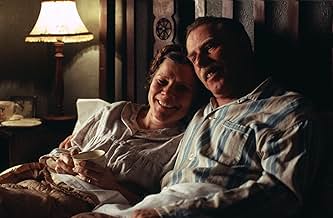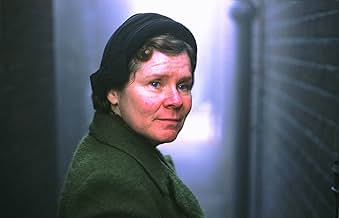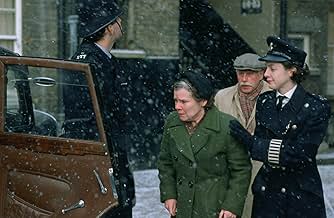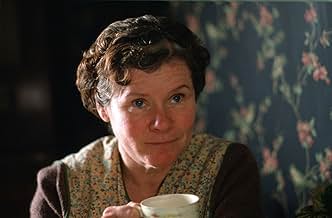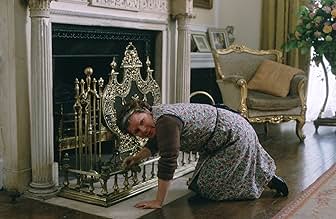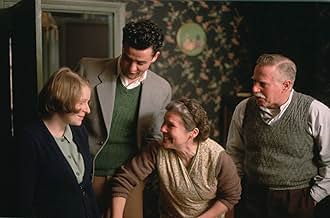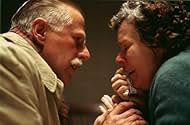Vera Drake
- 2004
- Tous publics
- 2h 5min
NOTE IMDb
7,6/10
28 k
MA NOTE
La faiseuse d'anges Vera Drake découvre que ses croyances et ses pratiques se heurtent aux moeurs de l'Angleterre des années 50? un conflit qui conduira à la tragédie pour sa famille.La faiseuse d'anges Vera Drake découvre que ses croyances et ses pratiques se heurtent aux moeurs de l'Angleterre des années 50? un conflit qui conduira à la tragédie pour sa famille.La faiseuse d'anges Vera Drake découvre que ses croyances et ses pratiques se heurtent aux moeurs de l'Angleterre des années 50? un conflit qui conduira à la tragédie pour sa famille.
- Nommé pour 3 Oscars
- 41 victoires et 45 nominations au total
Sinead Matthews
- Very Young Woman
- (as Sinéad Matthews)
Avis à la une
I have been a longtime fan of Mike Leigh, always fascinated to see his slice of life take on England. Because of his well known creative process, the intrigue would be to see the actors and the characters and dramas (and comedies) they created. They were always worth watching in a voyeuristic way due to Leigh's unobtrusive camera work.
Vera Drake is well worth seeing for these same reasons, but Leigh has made a bigger and better movie than ever before, even with all of Topsy Turvy's bombast. His ambitions as director are greater than ever. First of all, to take on the subject of abortion is very brave. But I'll leave that for others to discuss. What was of interest to me from the opening shot was that this was going to be a visual tour de force, and it was.
Painting the scenes in dark, crushing browns and greens, with tight camera angles or letting the light in, each scene had the feel of a well thought out canvas, even the cut aways between scenes were new, inventive and beautiful.
And the acting is great and the scenes of the family interacting in close quarters, moving in synch are so pitch perfect you feel they have been doing this for decades.
So if you're thinking of seeing this movie, sit back, relax, and prepare to be taken on a slow, masterful ride.
Vera Drake is well worth seeing for these same reasons, but Leigh has made a bigger and better movie than ever before, even with all of Topsy Turvy's bombast. His ambitions as director are greater than ever. First of all, to take on the subject of abortion is very brave. But I'll leave that for others to discuss. What was of interest to me from the opening shot was that this was going to be a visual tour de force, and it was.
Painting the scenes in dark, crushing browns and greens, with tight camera angles or letting the light in, each scene had the feel of a well thought out canvas, even the cut aways between scenes were new, inventive and beautiful.
And the acting is great and the scenes of the family interacting in close quarters, moving in synch are so pitch perfect you feel they have been doing this for decades.
So if you're thinking of seeing this movie, sit back, relax, and prepare to be taken on a slow, masterful ride.
In the early 1950's, Britain is still very much recovering from the war years and the working classes are very much held together by salt-of-the-earth types supporting their families and others. One such woman is Vera Drake; mother, wife, carer, cleaner and part-time back-street abortionist. Vera takes no money for her work and simply wishes to give them the help that they cannot afford to get through legitimate channels. However not everyone shares her view of abortion and it is only a matter of time before Vera's work comes to the attention of the authorities.
Bearing in mind that this film being mentioned in the Oscars, Baftas and general glowing support of critics, it is easy to forget that it raced through the UK's multiplexes so quickly that I had to wedge myself into a sold-out art-house cinema just to see it (sold out, that is, on an afternoon screening). It is even easier to forget that fewer than 1000 people have even voted for this title as I write this review. Certainly watching it yesterday it is easy to understand why it is feted by critics but not the choice of thousands of teenagers for a Saturday night at the movies, because it is a very slow, difficult film that is far from being a bundle of laughs. However it is still a fascinating film throughout even if it is not as strong as could have been expected. The story is basic and it can't quite fill the time, maybe down to the way it was written that is, it was written as a frame and the dialogue was improvised and workshopped rather than scripted in the traditional fashion (hence Leigh's surprise at one of his Oscar nominations!).
While this weakens the story a little, it seems to have produced great performances from the cast that do more than cover for the slow pace. Staunton is superb and she stands out in the best actress category. She is a complex character that the film never easily pigeonholes and it shows how balanced the film is in the way we are not swayed in her favour by her character whenever her morals come under fire. The film is very much hers and she is totally convincing in her character. She is well supported by natural performances from Graham, Davis, Marsan and Mays among others. Leigh's direction is very intimate and, with sets and costumes, he has painted a convincingly downbeat view of post-war Britain that looks good and adds to the realistic feel of the film.
The film had a lot less debate than I had expected and it doesn't really come down on either side of the abortion issue; I guess that it is better that it leaves it to us to think over rather than preaching to us how nice (and unusual) to be treated like adults by a film. Overall though, it is the story and Vera herself that make the film so involving, the story is well framed and the workshop approach has produced some very good performances, particularly from Staunton, who outshines all others nominated alongside her in the Oscars. Deserves to be seen by larger audiences than it has had thus far, but just don't expect it to be fast-paced, fun or gripping it is much more than that.
Bearing in mind that this film being mentioned in the Oscars, Baftas and general glowing support of critics, it is easy to forget that it raced through the UK's multiplexes so quickly that I had to wedge myself into a sold-out art-house cinema just to see it (sold out, that is, on an afternoon screening). It is even easier to forget that fewer than 1000 people have even voted for this title as I write this review. Certainly watching it yesterday it is easy to understand why it is feted by critics but not the choice of thousands of teenagers for a Saturday night at the movies, because it is a very slow, difficult film that is far from being a bundle of laughs. However it is still a fascinating film throughout even if it is not as strong as could have been expected. The story is basic and it can't quite fill the time, maybe down to the way it was written that is, it was written as a frame and the dialogue was improvised and workshopped rather than scripted in the traditional fashion (hence Leigh's surprise at one of his Oscar nominations!).
While this weakens the story a little, it seems to have produced great performances from the cast that do more than cover for the slow pace. Staunton is superb and she stands out in the best actress category. She is a complex character that the film never easily pigeonholes and it shows how balanced the film is in the way we are not swayed in her favour by her character whenever her morals come under fire. The film is very much hers and she is totally convincing in her character. She is well supported by natural performances from Graham, Davis, Marsan and Mays among others. Leigh's direction is very intimate and, with sets and costumes, he has painted a convincingly downbeat view of post-war Britain that looks good and adds to the realistic feel of the film.
The film had a lot less debate than I had expected and it doesn't really come down on either side of the abortion issue; I guess that it is better that it leaves it to us to think over rather than preaching to us how nice (and unusual) to be treated like adults by a film. Overall though, it is the story and Vera herself that make the film so involving, the story is well framed and the workshop approach has produced some very good performances, particularly from Staunton, who outshines all others nominated alongside her in the Oscars. Deserves to be seen by larger audiences than it has had thus far, but just don't expect it to be fast-paced, fun or gripping it is much more than that.
Mike Leigh has done it again. I adore "Secrets and Lies", my 2nd favorite film of all time and Leigh strikes gold again in the emotionally draining, brilliantly directed study of a 50's era abortionist in London. Imelda Staunton gives, yet another in Leigh's film, outstandingly powerful and true performance as Vera Drake. She a inner-city housewife and mother, who spends much of her free time trying to "help out" the poor ladies of 50's London who are unable to get legal abortions. Some may consider this a hot-topic issue film, but it's moreover an independent study of a woman and her life, and how her emotions play in her world. Every nuance of this film is perfectly crafted, from every performance, to the sets, and the cinematography. The emotions overflow steadily, especially after the traumatic dinner scene where the police arrive for Vera. The look of horror that Staunton displays and changes as she realizes what is happening is acting and direction at it's best. Why is it American films aren't able to capture this from it's performers? I can't praise this film enough and truly believe that this will be my favorite film of the year. It's a shame this film got only a small release and audiences seemed unmoved by it. I don't understand it. Hopefully DVD will allow those who missed it to catch up with it and relish in it's brilliance. It will be a rewarding experience for all to see. I am praying for Oscar noms all around, but especially for Staunton. It is clearly and without any doubt, the best female performance as of this date, this year.
"Vera Drake" makes us realize how few of the classic kitchen sink, working class dramas of post-war Britain, whether in film or theater, were from the viewpoint of women ("Georgy Girl" and "A Taste of Honey" were among the few). Oh, girlfriends got knocked up in those works, but they were always seen as manipulative strangleholds to the freedom of the Angry Young Men; they should just take care of it.
With exquisite attention to complete period detail in body language, coloring, clothes, physical surroundings, etc. that fill the screen as much as he did theatrically in re-creating "The Mikado" in "Topsy Turvy," Mike Leigh takes us to the other side of that doorway that the older movies rarely showed us, (though in the '60's the original "Alfie" and the schmaltzier Hollywood "Love with the Proper Stranger" gave us an exaggerated view). The film also works in tandem with Peter Mullan's "The Magdalene Sisters" in showing how cruel life in Ireland and Britain could be for women with unwanted pregnancies, though evidently this film is not a docudrama.
This complete mise en scene (including contrasts with the upper crust families she works for as a domestic) very gradually gives us the matter of fact quotidian of Drake's mundane life of caring for her family and the neighborhood unfortunates, including girls she "helps out."
Imelda Staunton's self-effacement into the role and her character's into her environment doesn't prepare us for how she comes to completely overwhelm us.
Leigh created a similar working class world in "All of Nothing," but that film had no trajectory, virtually nothing happened to those characters, and none of the characters were as completely sympathetic as naive Drake is. It is wonderful to see a character actress get to fill the screen for long, emotional close-ups. The audience in the almost sold out theater I was in was completely gripped in silence and holding their breath as her life played out. Too bad the hot subject matter of abortion will probably keep her from getting an Academy Award.
Because of the vivid realism in the film, it is frustrating that there is no factual information provided, for example, as to when abortions became legally available to all women in Britain. A few facts are thrown out about enforcement and consequences, but those are anecdotal, though the class differences are portrayed vividly.
One is left with complete sadness that for all the specificity of time and place in the film, we could easily go back to a time like this when abortions are illegal and unsafe, because there will always be women who feel that is their only option, whether single, married, poor or rich. The past is prologue to the future.
With exquisite attention to complete period detail in body language, coloring, clothes, physical surroundings, etc. that fill the screen as much as he did theatrically in re-creating "The Mikado" in "Topsy Turvy," Mike Leigh takes us to the other side of that doorway that the older movies rarely showed us, (though in the '60's the original "Alfie" and the schmaltzier Hollywood "Love with the Proper Stranger" gave us an exaggerated view). The film also works in tandem with Peter Mullan's "The Magdalene Sisters" in showing how cruel life in Ireland and Britain could be for women with unwanted pregnancies, though evidently this film is not a docudrama.
This complete mise en scene (including contrasts with the upper crust families she works for as a domestic) very gradually gives us the matter of fact quotidian of Drake's mundane life of caring for her family and the neighborhood unfortunates, including girls she "helps out."
Imelda Staunton's self-effacement into the role and her character's into her environment doesn't prepare us for how she comes to completely overwhelm us.
Leigh created a similar working class world in "All of Nothing," but that film had no trajectory, virtually nothing happened to those characters, and none of the characters were as completely sympathetic as naive Drake is. It is wonderful to see a character actress get to fill the screen for long, emotional close-ups. The audience in the almost sold out theater I was in was completely gripped in silence and holding their breath as her life played out. Too bad the hot subject matter of abortion will probably keep her from getting an Academy Award.
Because of the vivid realism in the film, it is frustrating that there is no factual information provided, for example, as to when abortions became legally available to all women in Britain. A few facts are thrown out about enforcement and consequences, but those are anecdotal, though the class differences are portrayed vividly.
One is left with complete sadness that for all the specificity of time and place in the film, we could easily go back to a time like this when abortions are illegal and unsafe, because there will always be women who feel that is their only option, whether single, married, poor or rich. The past is prologue to the future.
Imelda Staunton is superb and is my bet for the Oscar unless some Hollywood Diva does another "out of character" performance. But she only shines because of the company she keeps.This is ensemble acting at it's finest. No melodramatics, no attempt to steal scenes,and the result is as honest as life itself. This is the way the British talked, almost always indirectly, hedging around issues rather than hitting them head on, and a slave to mannered behavior. Understate, understate, understate.
Having lived in England from 1952 to 1959, and having married someone who was British who grew up during the war and it's aftermath this movie was like "a bit of old home." My mother employed "char ladies" like Vera, although we were "upper middle class" rather than "upper." The class differences were quite distinct in those days, and often determined by accent. What this movie shows is not only the average life of a "lower class" family but the options forced on them that were different from those in the higher brackets of society.
As anyone should know by know the movie is about illegal abortion in a rigid
puritanical society. Illegal, that is, for those without means, but quite available to those who could grease the wheels of the medical establishment who had "legal" ways around the law. In other words if Roe v. Wade goes then Vera's will pop up again.
There is no attempt to make a statement for or against abortion. As Mike Leigh has said: abortion has been in every society for thousands of years. The Vera Drake's who have lived could populate a small city. What this movie does do is emphasize that the Vera's were/are common average people not quasi criminals lurking behind the curtains of some seedy back alley shack, and that legislating morality never addresses the often harsh reality of human society.
Having lived in England from 1952 to 1959, and having married someone who was British who grew up during the war and it's aftermath this movie was like "a bit of old home." My mother employed "char ladies" like Vera, although we were "upper middle class" rather than "upper." The class differences were quite distinct in those days, and often determined by accent. What this movie shows is not only the average life of a "lower class" family but the options forced on them that were different from those in the higher brackets of society.
As anyone should know by know the movie is about illegal abortion in a rigid
puritanical society. Illegal, that is, for those without means, but quite available to those who could grease the wheels of the medical establishment who had "legal" ways around the law. In other words if Roe v. Wade goes then Vera's will pop up again.
There is no attempt to make a statement for or against abortion. As Mike Leigh has said: abortion has been in every society for thousands of years. The Vera Drake's who have lived could populate a small city. What this movie does do is emphasize that the Vera's were/are common average people not quasi criminals lurking behind the curtains of some seedy back alley shack, and that legislating morality never addresses the often harsh reality of human society.
Le saviez-vous
- AnecdotesExcept for Imelda Staunton, none of the actors knew the film was about abortion until their characters found out.
- GaffesVera's sister-in-law Joyce says she wants a washing machine which costs "25 pounds." Until decimalization in 1971, most luxury goods, like washing machines and men's suits, were priced in guineas, not pounds (one guinea = one pound one shilling, or one pound five pence in decimal). Some stores, particularly those wishing to appeal to the middle class or aspiring to a degree of 'poshness', priced items in pounds. Throughout the 1960s most domestic items were priced in pounds, shillings, and pence. Services and professions continued to charge in guineas until much later. In the film, an abortion costs two guineas.
- Bandes originalesSalut D'Amour (Liebesgruss), Op.12
(1888)
Written by Edward Elgar
By permission of Schott & Co Limited, London
Performed by Rosemary Warren-Green (violin) and Ian Brown (piano)
Meilleurs choix
Connectez-vous pour évaluer et suivre la liste de favoris afin de recevoir des recommandations personnalisées
- How long is Vera Drake?Alimenté par Alexa
Détails
- Date de sortie
- Pays d’origine
- Langue
- Aussi connu sous le nom de
- El secreto de Vera Drake
- Lieux de tournage
- Sociétés de production
- Voir plus de crédits d'entreprise sur IMDbPro
Box-office
- Budget
- 11 000 000 $US (estimé)
- Montant brut aux États-Unis et au Canada
- 3 775 283 $US
- Week-end de sortie aux États-Unis et au Canada
- 13 207 $US
- 10 oct. 2004
- Montant brut mondial
- 13 267 869 $US
- Durée
- 2h 5min(125 min)
- Couleur
- Mixage
- Rapport de forme
- 1.85 : 1
Contribuer à cette page
Suggérer une modification ou ajouter du contenu manquant


